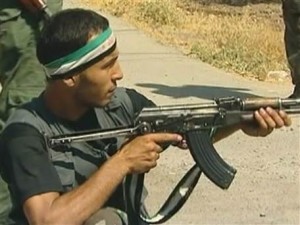 Syrian activists say the flow of arms to rebels has slowed over the past two weeks, a pause that might be temporary but could reflect growing concern over the militarisation of the 16-month conflict.
Syrian activists say the flow of arms to rebels has slowed over the past two weeks, a pause that might be temporary but could reflect growing concern over the militarisation of the 16-month conflict.
Activists give differing interpretations of what they say are shipments of weapons that are not making it across the usual route – the Turkish-Syrian border.
One leading opposition figure said the blockage was due to Turkish anxiety in the wake of Syria’s downing of a Turkish jet last month.
“There are meetings being held every day with the Turks and we hope that the issue will be resolved soon,” the opposition figure said.
Another activist who works with the Free Syrian Army, the loose group of rebels, says there is a cooling of both weapons deliveries and funding – which have been originating from Qatari and Saudi sources – to give diplomatic efforts to end the crisis a chance of success. He suspected Russia would also decrease weapons shipments to the Syrian regime of Bashar al-Assad.
“Whatever the motive, the result is the same – it is a reduction,” says Louay Mikdad, a logistics co-ordinator with the Free Syrian Army.
A Russian official indicated earlier this week that there would be no new delivery of arms to Syria, but later added that previously signed contracts would be honoured. Western diplomats say there is no clear sign that Moscow, Mr Assad’s chief international backer, is willing to curb its military assistance.
While Qatar and Saudi Arabia have both supported arming the rebels, they do not confirm any official involvement. Turkey denies that it helps facilitate the arms flow, which activists say are usually delivered by Turkish intelligence to the rebels on the Syrian side of the border. Western governments have warned that arming the rebels is leading to a further escalation of the conflict.
The delays in weapons deliveries come as Saudi Arabia’s government clamps down on a campaign by radical Sunni clerics to raise funds for Syria’s opposition, amid fears that the money could end up in the hands of jihadis.
A so-called “ulema committee for the support of Syria” said on its Facebook page last month that its members – many of them Salafi clerics who are not part of the official establishment – were suspending a donations drive, as demanded by the authorities.
Analysts say Riyadh is insisting that all donations to Syria, which are mostly destined for humanitarian assistance, should be made through official channels, to avoid bolstering the jihadi element in the uprising, which the UN now describes as a third actor in the Syrian crisis.
Partly as a result of more weapons, the rebels’ capabilities have improved in recent months and they have inflicted rising numbers of casualties on the regular army. According to the UK-based Syrian Observatory for Human Rights, at least 4,348 members of security forces loyal to the regime have died since the start of the uprising in March 2011. The conflict has also claimed the lives of 11,897 civilians and armed insurgents and 884 defecting soldiers.
Syrian political activists who are supportive of the rebel armament effort say the obstacles that have emerged over the past two weeks could weaken the insurgency. “It is an injustice because we don’t have any stores inside the country,” said one activist with knowledge of the delays in weapons delivery. “We cannot fight this regime without ammunition, it is without balance – tanks against bodies.”
Brigadier General Mustafa al-Sheikh, a rebel commander based on the Turkish-Syrian border, played down the potential damage to the insurgency, however. He said the fighters’ main strategy was to seize weapons and ammunition from the Syrian army.
“We haven’t been counting on outside help and what we’ve received would not even cover 30km of battleground,” he said “We know that there is pressure on the opposition and we feel that no one wants to help.”
Financial Times

Leave a Reply
You must be logged in to post a comment.